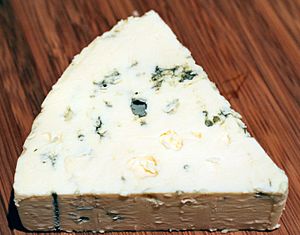Danish Blue Cheese facts for kids
Quick facts for kids Danablu |
|
|---|---|
 |
|
| Other names | Danish Blue |
| Country of origin | Denmark |
| Source of milk | Cows |
| Texture | Semi-soft |
| Aging time | 8–12 weeks |
| Certification | Danablu: PGI |
Danablu, often called Danish Blue Cheese, is a popular type of blue-veined cheese from Denmark. It's a semi-soft cheese, which means it's not too hard or too soft. You'll often find it shaped like a drum or a block. It has a yellowish outer layer, called a rind, that is safe to eat.
Contents
What is Danablu Made From?
Danablu is made from the rich, full-fat cow's milk and cream. This cream is often homogenized, meaning its fat particles are broken down to make the cheese smoother. Danablu has a fat content of about 25–30%. It needs to age for about eight to twelve weeks to develop its special taste and texture.
How is Danablu Made?
Before the cheese ages, it goes through an interesting step. Workers use thin copper wires or rods to poke holes into the cheese. These holes help spread the special mould called Penicillium roqueforti evenly throughout the cheese. This mould is what gives blue cheese its unique blue veins and strong flavor. When you cut a piece of Danablu, you can still see these small holes.
The Story of Danablu
Danablu was created in the early 1900s by a Danish cheese maker named Marius Boel. He wanted to make a cheese that was similar to the famous Roquefort cheese from France. However, Danablu has its own distinct taste. It's known for being a bit milder than Roquefort, but it still has a sharp, salty flavor.
How to Enjoy Danablu
Danablu is a very versatile cheese. Many people enjoy crumbling it over fresh salads. It also makes a great dessert cheese when served with fruit. In Denmark, it's often eaten simply on bread or with savory biscuits.
Special Protection for Danablu
Danablu is one of only three Danish cheeses that have a special protection called PGI (Protected Geographical Indication) from the EU. This means that for a cheese to be called "Danablu," it must be produced only in Denmark. It also has to be made using Danish milk and at special dairies that follow strict rules for making the cheese. This protection helps keep the quality and tradition of Danablu strong.
See also
 In Spanish: Danablu para niños
In Spanish: Danablu para niños

